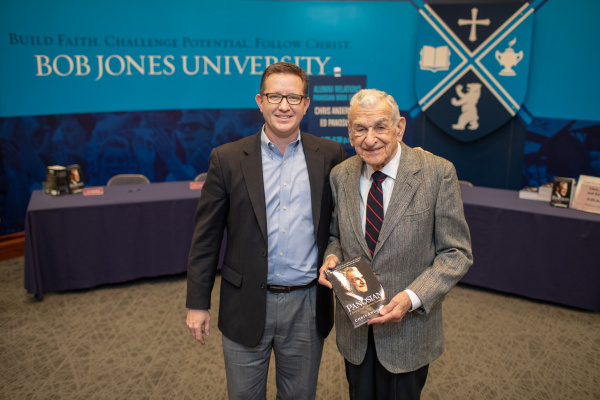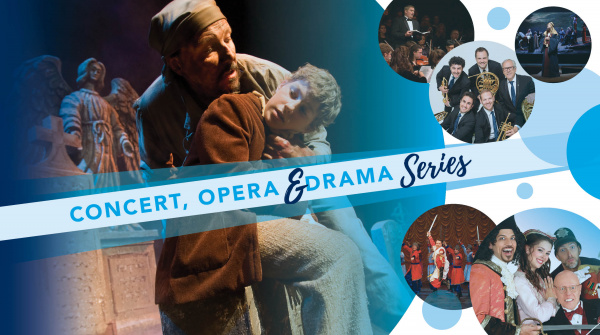On October 10, the BJU Homecoming concert and first Concert, Opera & Drama Series of the fall will be Panosian and the Providence of His Story.
Edward Panosian’s story revolves around the history of a people from Armenia, a country east of modern-day Turkey and part of the declining Ottoman Empire on the eve of World War I. During the empire’s years, the Turks’ prejudice against the Armenians increased until the tension culminated in several years of genocide.
Features of the BJU Homecoming Concert
As the title of the program indicates, the focus is on Panosian—a BJU history professor for over 50 years. Although he was widely known on campus, his story was not—Panosian’s Armenian family was directly impacted by the genocide. In fact, his parents immigrated to New York to escape it.
Dr. Paul Radford, head of the Department of Communication Studies, said, “We are trying to provide a platform for … Dr. Panosian (to) tell his family story. … And he’s also a history teacher … so he’s in a unique position to be able to tell (about the genocide).”
The program will also give a platform for local singer-songwriter Mariam Matossian to tell her story. Matossian’s maternal grandparents and her paternal grandmother survived the genocide. Her maternal grandmother—for whom she is named but never met—taught her mother folk songs, which she then passed down to Matossian. With her love for these folk songs and a classically trained voice, Matossian began to perform professionally in 2004.
The songs that Matossian sings have intentional themes, “themes of love and joy, loss and pain,” she said. Through the songs, she also gives others a taste of her family’s culture. “As I perform these traditional folk songs of Armenia and my own creations, I have the unique privilege of sharing the beauty and richness of my beloved culture with a world audience.”
This BJU Homecoming concert will be a multimedia presentation. Between movements of the “Exile” Symphony—performed by the BJU Symphony Orchestra—Panosian will share family history through videos recorded during the summer. Matossian will perform during the second half of the program, sharing both her songs and her stories. Historic images and family pictures will also be shown on the screens.
About the Music
Rather than being the program’s focus, the orchestra will instead support the stories. “The orchestra is really going to be (acting as a) soundtrack for the first half of the program,” said Dr. Michael Moore, chair of the Division of Music. “We had this opportunity to use music and storytelling to give our student body and our community a (glimpse) of what the Armenian Genocide was … and so we began to look for music that would help to tell that story.”
He chose the “Exile” Symphony (technically Symphony No. 1, Op. 17) by American composer Alan Hovhaness to best support the theme.
Hovhaness—whose father was Armenian—wrote the symphony in 1936 to commemorate the Armenian Genocide. He named the three movements Lament, Conflict and Triumph. In the ‘70s, he made changes to the symphony, rewriting the second movement and removing the names. But the cultural elements and emotions still remain. Said Moore: “You can hear echoes of call to prayer and hymns … that, if not directly quoting liturgical music, are at least evocative of that. (And the symphony) clearly has some non-western influences.” The orchestra will play this revised version.
The orchestra will also accompany Matossian. She will bring her folk instruments with her—the oud, duduk and hand percussion—but Moore explained that the orchestra will “give a symphonic quality to this beautiful music.” Dr. Yuriy Leonovich of BJU’s string faculty created simple orchestral arrangements based on the folk instruments’ parts.
The Spark of an Idea
Radford became aware of Armenian history at a camp in Cyprus. During the four summers he spent there in the early 2000s, Radford learned about the genocide from Armenians he met. He wanted to raise awareness of the genocide at its centennial in 2015. And when a film about the genocide came out in 2016, his desire to share the story increased. However, in the midst of writing a dissertation, Radford had to postpone his plan.
On the other hand, Moore recently began thinking about the possibility of a program on the Armenian Genocide. Reading Chris Anderson’s book Panosian: A Story of God’s Gracious Providence (2018) piqued Moore’s interest. Realizing the incredible story of his former history professor, Moore wanted others to know about it. “I just began thinking it would be great to have some kind of a way to educate our students about this and honor (Panosian),” he said. “(I) thought Homecoming would be a really good time to do that because … he’s taught tens of thousands of BJU alumni.”
When Moore mentioned the idea over lunch this summer—only a few months ago—Radford and Moore realized that they had the same vision. The program planning commenced.
See Also: The Making of the Panosian Biography
More Than Just History
The Armenian Genocide, like any other historical event, impacted people’s lives. “There are stories that need to be told,” Radford said. “These stories tell of persecution due to a people’s ethnicity and Christian religion.”
However, although the genocide is history, it is still relevant. “Within the last few years, this has been a hot topic. There has been a suppression of this story being told,” said Radford, referring to its treatment in media and entertainment. “(There is) controversy over what really happened.”
When learning about the stories of these people, it is also important to understand their culture. For the program, Radford said, “We kind of give a history lesson, but we’re transitioning into the here and now … exploring the culture of the Armenian people (today).” Moore said, “There’s a resilience to this culture and a beauty that’s flourishing.”
However, this program also seeks to look beyond the past and present. “There’s a progression from … a terrible history to a beautiful hope for the future,” Radford said. “It’s not all doom and gloom,” Moore said. “It’s about God’s providence.”







